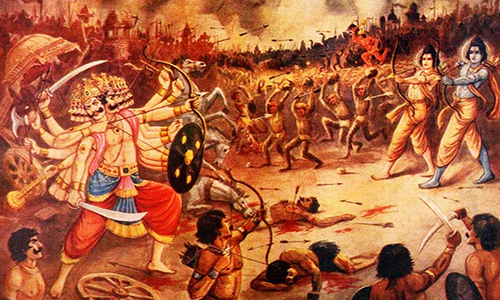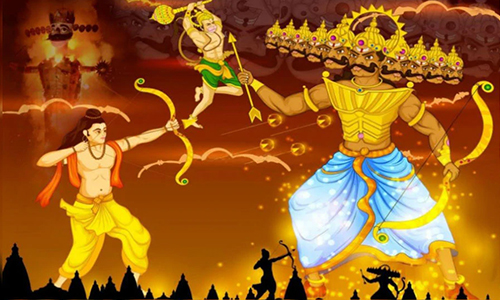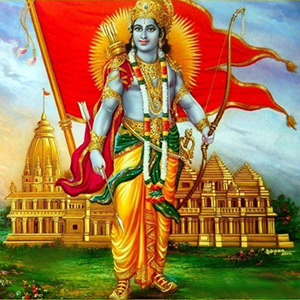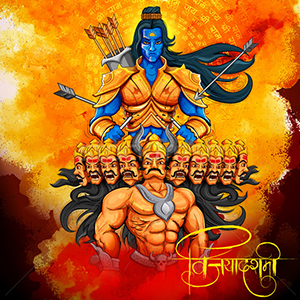Dussehra has different names including Dashahara, Dashain (in Nepal), Durgotsav, Navratri, or Vijayadashmi). It is one of the biggest Hindu festivals celebrated on the tenth day of Shukla Paksh in the month of Ashwin. One of the unique things about this festival is the celebration in different way in India and the neighbouring countries where Hinduism is followed. On the day of Dusshera, there are different pujas performed including- Shami Puja, Aparajita Puja and Seema Avalanghan.
Dussehra falls in the month of September or October as per the Gregorian calendar. The word Dusshera derives from two word “Dus” meaning ten and “Hara” meaning defeat symbolizing win over ten-headed demon Ravana. Lord Rama is seventh incarnation of Lord Vishnu. The festival also marks the victory of Goddess Durga over the buffalo demon Mahishasura.
Significance of Dussehra or Vijayadashami:
The festival is celebrate to commemorate the victory of good over evil. Demon king Ravana abducted Rama's wife, Sita and kept her captive in Lanka, his abode. However, the devoted wife Sita silently waited and believed that Lord Rama would come and rescue her. To rescue her, Lord Rama fought an epic war with Ravana to rescue Sita.
The war lasted for ten days, and on the 10th day, Ravana was killed and was called as Dashami (the tenth lunar day of the Hindu calendar month). This glorious victory of good over evil and the homecoming of Rama, Lakshman, and Sita along with Hanuman were and still celebrated in the form of Dussehra by Hindus.

Ram Navami festival - the antecedents of Dussehra
Ram Navami festival is celebrated on birth of Lord Rama. According to Hindu month, it is celebrated on the ninth day of the Chaitra. On this day, Ram temples across India witnesses’ grand celebration and devotees throng at temples to offer special prayers, and perform special recitals of Ramayana (akhanda path). Dusshera is celebrated as the continued reverence of Rama and his victory over evil.

Legends of Dussehra
Legends associated with Dussehra portray stories to fight for good over evil. On this day, Goddess Durga hailed victory over killing Mahishasura and his demons. Goddess Durga derived powers from different lords to kill Mahishasura, and it took place after nine nights on the tenth day, and is called Vijaya (victory) Dashami.
Legends also believe that on this day Rama had performed "Chandi Homa" to invoke the blessings of Durga. The Goddess helped him with a secret knowledge to kill Ravana. On the tenth day, Rama, after days, finally found Sita in Ashok Vatika and defeated Ravana. This great event of win is called Vijaya Dashami.
Vijayadashami is also the auspicious day to begin formal learning. Students, on this day, keep their books in front of Goddess Saraswati to get blessed on the ninth day of Navratri till the puja on Vijayadashami, the tenth day.
Another legend says, Pandavas returned to their kingdom on the day of Dussehra after ending their exile to rule.

Importance of Dussehra
Dussehra is a festival to celebrate good over evil. It is celebrated in a beautiful manner with colours. Garba, the traditional dance form practiced in Gujarat, is played by thousands for all nine nights of Navratri till Dusshera and worship Ambe Mata (Durga Devi). It is a beautiful form of dance, where people make a circle wearing authentic Garba dress.
In professional front, Dusshera is an auspicious day to begin new ventures. Different states across India follow different forms of Dusshera, but is beautiful to watch where people are happy to worship of good.

Rajeev Singhal's Personal Message on Dussehra
The battle between Rama and Ravana is the war between Sankalpa (your ultimate Intention) and is the occasion of Distractions due to Vrittis of the mind helping to bring back awareness (Sita) within.
One needs to shed the vices of KAMA VASANA (Lust), KRODHA (Anger), MOHA (Attachment), LOBHA (Greed), MADA (Pride), MATSARYA (Jealousy), SWARTHA (Selfishness), ANYAAYA (Injustice), AMANAVTA (Cruelty), AHAMKARA (Ego) to purify the Citta and realise the Self within:
 Google has chosen Shaligram Shala ( shaligram.com) as the world's first 5 star
Google has chosen Shaligram Shala ( shaligram.com) as the world's first 5 star  rated Rudraksha supplying Company
rated Rudraksha supplying Company 

 Google has chosen Shaligram Shala ( shaligram.com) as the world's first 5 star
Google has chosen Shaligram Shala ( shaligram.com) as the world's first 5 star  rated Rudraksha supplying Company
rated Rudraksha supplying Company 

 Date, Time and Significance.jpg)
 Dussehra (Vijayadashmi): Date, Time and Significance
Dussehra (Vijayadashmi): Date, Time and Significance 
















































